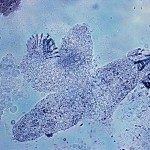Présentation
Aaron JEX – Walter & Eliza Hall Institute, Faculty of Veterinary and Agricultural Sciences, Melbourne University (Parkville – Australie)
Abstract: This seminar presents a transcriptomic, proteomic and histone epigenetic investigation of the sporozoite stage of the relapsing malaria parasite, Plasmodium vivax, in the salivary gland of the mosquito host, providing detailed insight into the molecular biology of this parasite as it prepares to invade the human host. Through comparisons to recently published data for P. vivax mixed blood-stages, we identified >1,500 sporozoite-enriched transcripts, including key genes involved in cell traversal, invasion of and development in the human hepatocyte and translational repression. Through proteomic sequencing, we identified >150 genes that are putatively translational repressed in the sporozoite, appearing to prime the sporozoite for invasion of the human host. We propose a role for some of these genes in setting the developmental fate of P. vivax sporozoites upon human host invasion. We report also, for the first time, epigenetic histone marks associated with transcriptional silencing (H3K9me3) and activation (H3K9ac and H3K4me3) and explore their potential role in regulating development in this key infective stage. Lastly, I will present a parallel project using in silico protein structural prediction to improve functional annotations of the complete P. vivax and P. falciparum proteomes and discuss how we are using this resource to extract additional biological relevant data from the current study and other applications for these and other parasites.
Biosketch: Prof Aaron Jex is a newly appointed lab head with the Population Health and Immunity division of the Walter and Eliza Hall Institute and Associate Professor of Parasitology within the Faculty of Veterinary and Agricultural Sciences of the University of Melbourne. His research group exploits systems biology and bioinformatics to better understand the molecular biology of invasion, host-parasite interactions, drug resistance and other stress responses of parasites, with a particular focus on human gastrointestinal parasites, zoonoses and, more recently, malaria.
Contact: Ivo MUELLER ( ivo.mueller@pasteur.fr – Poste 94.59)
